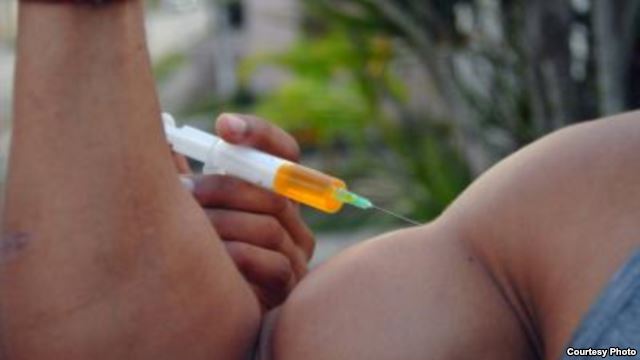
You don’t need to be an expert critic, clairvoyant sociologist or a wise politician to understand that when you grow up in a totalitarian and absolutist country like Cuba, flooded with numerous afflictions, it’s normal to feel small.
Thus, because of the great restrictions on individual freedom, the meager access to modernity and a determined idleness, every day more young Cubans, trapped in the wrong time of an epoch that doesn’t move on, however much it’s announced, and doesn’t arrive, evade reality by finding refuge in sex, drugs, alcohol, emigration, robbing, lying and in a new sickness that, although it’s not recognized as such by the international medical community, is now all the craze.
The consumption of anabolic steroids has grown into an epidemic, especially among adolescents and young people, who want to improve their physical and esthetic qualities. They also are sure they will lose body fat, which is in vogue.
In large measure, the creators of the problem are the media of communication. Cinema, television, literature, magazines, trying to sell a gallant beau, aren’t aware of what happens later. Prosecuting them now leads nowhere; what’s worrisome is the increase in young people cared for in the emergency rooms of Cuban hospitals, affected by severe liver and multiorgan failure, brought on by the consumption of anabolics, because the desire to look good, even as a form of social nonconformity, draws them to spend money for these substances that exaggerate their musculature.
Primobolan, Proviron, Winstrol, Parabolan, Anadrol – young people talk about the brand names and doses without having the remotest idea of the secondary effects.
The Cuban government knows about this, has the information, even has referred to the subject in extensive editorials that sound less convincing than Mariela Castro’s curriculum; but understanding that it’s a matter of an invisible hurricane, they prefer to practice their habitual sedentary politics of explaining and not acting. As if Poseidon, the Greek god of the sea, couldn’t stop a tsunami.
The Minister of Public Health, with total shamelessness, assures that the market for this type of substance is controlled; but it’s certain that young people can obtain it without much work in pharmacies, hospitals, sports schools and connections in the black market. But the principal providers of this “destructive spring” are some Cuban functionaries with the medical mission in Venezuela, who through a dark back-route and in complicity with officials of General Customs of the Republic of Cuba, send and let pass the product into the national territory by treating it as regulated but lawful trade.
The “Trafficking and holding of toxic drugs and other similar substances” is well-represented in Chapter V (Crimes against public health) of the Cuban penal code; but its sanction is poor, and by association, the business is easier, more profitable, less prosecuted than trafficking in cocaine, and it guarantees an equal number of dependent clients, creating a host of young people trapped between the weights and this addiction, scientifically called muscular distrophy or vigorexia, which obliges them to fall into the constant nightmare of raising their self-esteem. My aunt always repeated, “Mijo, don’t let yourself be fooled; there are no roses without thorns.”
Translated by Regina Anavy
2 June 2014
